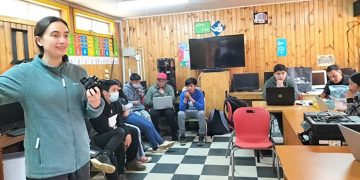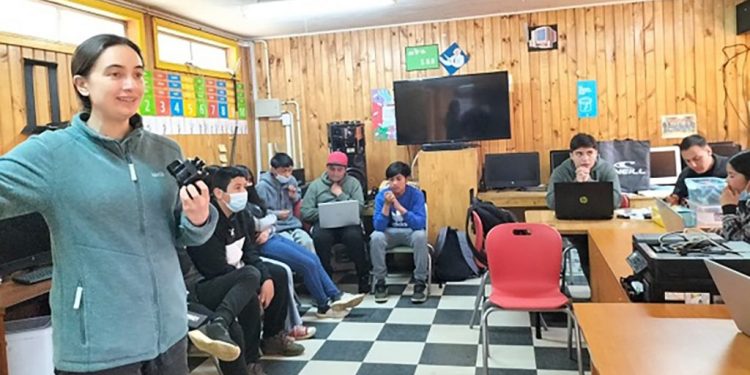Students of seventh and eighth grade of two rural schools of the Mapuche community of José Painecura Hueñalihuén, in Carahue, participate in an innovative project aimed at implementing a technological system of crops based on Internet of Things Technologies, IoT, with an energy supply with renewable sources and designed as an educational platform. This initiative is developed by a group of researchers from the Institute of Complex Engineering Systems, ISCI, of which the UdeC Engineering professor, Rosa Medina Durán, is a member.
This technological system includes the construction of a greenhouse in the Bajo Yupehue public rural School and one in the Vista Hermosa subsidized Private School, which considers traditional crops intended to revalue the Mapuche culture of the area and also combat the drought that has occurred due to climate change.
The UdeC teacher, Rosa Medina, said that the project is led by Doris Sáez Hueichapan, a researcher at ISCI, who, along with other professionals, has been working with the community of Hueñelihuén for quite some time. “The initiative started with the community headquarters, where they started installing solar panels and wind turbines to energize it,” he said. It should be noted that thanks to this initiative, an antenna with TV White Spaces technology was also installed, which uses the frequencies of unused TV channels in the UHF band to offer broadband connections or the Internet of Things (IoT).
The UdeC engineering teacher commented that, along with this, they built a greenhouse in which they implemented technology, sensors to obtain soil moisture, ambient temperature, solenoid valves to automate irrigation, among others. “Doris told me about the project and I found it super nice and invited me to get to know the community, they already had the greenhouse we proposed that it not only stay in the community, between adults, but to teach the same to children, in schools and there we started working in the two establishments,” said Medina.
In this way, together with the fifth year student of Industrial Civil Engineering, Camila Monsalvez Bastias, they focused on optimization, specifically of water, “since my area of specialization is combinatorial optimization, we established the automation of greenhouse irrigation,” Medina explained.
For the researcher, this initiative has allowed working on an engineering application with real interdisciplinary, which she described as “a nice challenge” and added that this project opens up a world for school students, “and for us too, because they have a lot of creative ideas that contribute to us”.
The children of the Carahue schools will have access to the platform that regulates the different actuators of the greenhouse, that is, it controls the solenoid valves, the windows that open or close, what data the sensors have recorded and this information remotely to support decision-making, “that is the idea of the greenhouse,” Medina said.
A source: https://noticias.udec.cl































